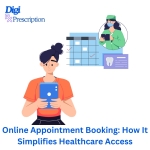
Online Appointment Booking: How It Simplifies Healthcare Access
In today’s digital era, healthcare access has transformed significantly, and online appointment booking is at the forefront of this revolution. This simple yet powerful tool has made scheduling medical appointments more convenient for patients and streamlined processes for healthcare providers. In this blog, we’ll explore how online appointment booking simplifies healthcare access and improves the overall patient experience.
What Is Online Appointment Booking?
Online appointment booking is a system that allows patients to schedule, modify, or cancel medical appointments via a website or app. It replaces traditional methods like phone calls, offering a faster and more user-friendly alternative.
How Online Appointment Booking Simplifies Healthcare Access
1. 24/7 Availability for Patients
Unlike traditional systems that require patients to book during office hours, online booking is accessible anytime, anywhere. This flexibility caters to busy patients who may need to schedule an appointment outside regular hours.
2. Reduces Administrative Hassles
Online booking eliminates the need for lengthy phone calls and manual schedule management. Healthcare providers can focus more on patient care while automated systems handle appointments.
3. Transparency in Scheduling
Patients can view available slots in real-time, making it easier to select a time that fits their schedule. This reduces back-and-forth communication and speeds up the booking process.
4. Automated Reminders and Notifications
Online systems send reminders via SMS or email to ensure patients don’t forget their appointments. This feature reduces no-shows, leading to better clinic efficiency.
5. Facilitates Telemedicine Appointments
For patients who can’t visit a clinic physically, online booking systems often integrate with telemedicine platforms, enabling virtual consultations. This is particularly beneficial for rural areas or patients with mobility challenges.
6. Increases Accessibility for Underserved Areas
In countries like Bangladesh, where healthcare access can be limited in rural regions, online appointment booking connects patients with doctors in urban areas. This ensures timely medical advice and treatment.
7. Enhances Patient Experience
A smooth, user-friendly booking system improves patient satisfaction. With features like quick booking, payment options, and appointment histories, patients feel more in control of their healthcare journey.
8. Supports Multilingual Interfaces
Many online systems offer multilingual support, making healthcare access easier for non-English speakers or those more comfortable in regional languages.
Benefits for Healthcare Providers
- Efficient Workflow Management: Automating scheduling allows clinics to handle more appointments with fewer errors.
- Better Resource Utilization: Doctors can manage their schedules effectively, optimizing patient flow.
- Data Insights: Online systems provide valuable analytics on patient preferences, peak booking times, and no-show rates.
- Increased Revenue: Reduced no-shows and improved appointment management contribute to higher earnings.
Real-Life Impact: A Case Study
In Bangladesh, clinics using online appointment systems have reported a significant increase in patient satisfaction and operational efficiency. One clinic noted a 30% reduction in no-shows within the first three months of adopting an online booking platform.
How to Implement Online Appointment Booking
- Choose a Reliable Platform: Look for secure, user-friendly software that meets your clinic’s needs.
- Train Staff: Ensure staff members are familiar with the system and can assist patients.
- Educate Patients: Promote the new system through social media, email campaigns, and in-clinic signage.
- Monitor and Adjust: Use analytics to track performance and refine the system as needed.
Conclusion
Online appointment booking is a game-changer in healthcare access. It offers convenience, transparency, and efficiency, benefiting both patients and providers. As technology continues to evolve, adopting such systems is no longer optional for modern clinics—it’s essential for staying ahead in a competitive healthcare landscape.
